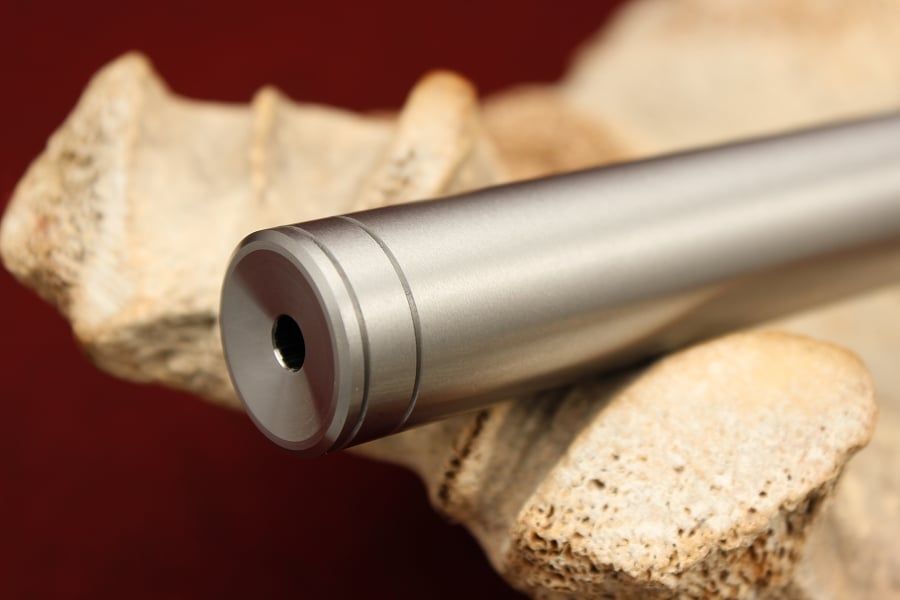KIDD 22LR Match Polished Barrel -Stainless or Black
- Aftermarket 10/22® barrel
- Slip-fit design
- Lengths: 20", 18", 16.5"
- Polished Stainless Steel
- HAND LAPPED individually
- 11-degree crown, 1:16 twist, convex extractor slot
- Heavy barrels slow down the shooter-targets are easier to acquire
- 1/2" at 50 yards 5 shot group guarantee
- nds.
Our aftermarket replacement for the .22LR bull barrel is the ultimate performer in accuracy. Our stainless-steel material along with our unique manufacturing procedures guarantee that our match barrel will group 1/2" at 50 yards. This bull barrel will slip into your Ruger® 10/22® receiver or other aftermarket 10/22® receiver. The best thing about these match bull barrels are their simplicity. They tend to be more nose heavy than our other barrels but, in this way, they create an advantage while target shooting. The advantage is created by slowing down the movement of the rifle. When the rifle movement is slow the target appears for a longer amount of time in the scope.
We believe these are the finest barrels on the market, each one is hand lapped. Our stainless-steel barrel is bored and rifled by Lothar Walther in Germany. Tony Kidd then performs all the final machining to make our match barrel a worthy KIDD product. A proprietary chamber reamer is used to ensure the cartridge and bullet feed smoothly. Our barrels are chambered to accept .22 LR ammo and have a 1:16 twist.
The unique convex extractor slot eliminates extraction problems by ensuring the extractor is always in perfect alignment with the case rim. Why doesn't everybody use this extractor slot? Because the tooling is very expensive and requires tolerances be held very close for proper machining. Each barrel receives an 11-degree crown and the double ring at the muzzle end with KIDD marked on the barrel.
Barrel weight:
20" match barrel= 3 pounds 5 ounces
18" match barrel= 3 pounds 3 ounces
16.5" match barrel= 3 pounds 1 ounce
Avoiding "barrel droop":
First and foremost, barrel droop is eliminated with a solid fit between the barrel and the receiver. If the barrel slips in too easily then the shooter should already be aware that there is not a secure fit and gravity will start doing her work immediately. Or if the barrel tenon is not the same diameter throughout the length then a teeter totter effect is set in motion. For instance, if the breach end of the tenon is smaller than the shoulder end the weight of the barrel will "pull" the barrel down and barrel droop is created. Or if the breach end of the tenon is larger than the shoulder end then as the tenon is installed in the mortise the breach carves a larger hole and again a teeter totter effect is created as the smaller shoulder end of the tenon sits is a hole that is too large. This same effect would happen if the middle of the barrel tenon was enlarged.
KIDD eliminated barrel droop with the utilization of a resistance fit in this mortise and tenon joint, meaning that the KIDD barrel tenon is just slightly larger in diameter than the KIDD receiver mortise and we make certain that the tenon is the same diameter throughout the length.
Another problem area to be aware of is the proper utilization of the shoulder. If the shoulder of the barrel does not set flush against the receiver, the support isn't there. Comparable to setting down a tall glass with a convex bottom, it wants to tilt. We make certain that the shoulder created between the .920" diameter and our tenon is precise. This requires specialty cutting tools to create a very clean step. But if done with less care there will be a ramp rather than a step between these two differing diameters. This ramp will not support the necessary weight and will prevent the shoulder of the barrel from sitting flush against the receiver.
When this barrel fitment is secure, we recommend the v-block screws just need to be snug, around 10-inch pounds, which is just snug enough to keep the barrel from moving forward, but not too tight to pull the barrel out of alignment.
Barrel installation:
Depending on your receiver, if there is paint built up in the receiver mortise be sure to scrape that out. We recommend using an anti-seize compound to assist in installation. Anti-seize is readily available at automotive stores or in our maintenance tab. It is best if you can get the barrel tenon started into the receiver mortise, then turn it over and tap the back of the receiver with a rubber mallet. Be sure to line the extractor slot up as you are installing the barrel. Your barrel is ready to shoot, just run two magazines through it before you really start looking at group size. Do this each time you change brands of ammunition as well. Keep the chamber clean, but don't clean the bore too much, you will decrease accuracy. Depending on the ammo, clean the bore around every 500 rounds.

